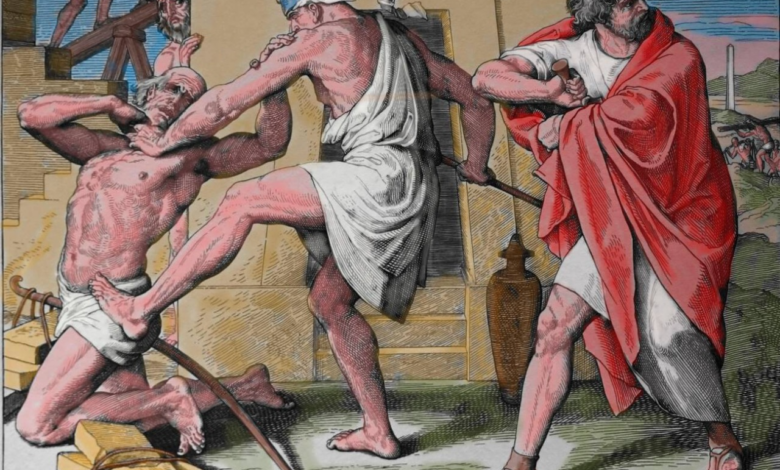Did God Allow Moses to Kill an Egyptian? (Exodus 2:11-14)

Throughout biblical history, God has used various individuals to fulfill His divine plans, even when their actions seem controversial. One such instance is Moses’ killing of an Egyptian in Exodus 2:11-14. Many wonder whether this act was sanctioned by God or if it was merely a human impulse. Did God allow Moses to commit this act to prepare him for his greater mission? Or was it an error that shaped his journey of faith and redemption? The question remains, did God allow Moses to kill an Egyptian in Exodus 2:11-14?
Moses’ Act: Sin or Divine Plan?
Moses, raised as a prince in Egypt, was aware of his Hebrew heritage. One day, he witnessed an Egyptian mistreating a Hebrew slave and, in a moment of passion, killed the oppressor. The question arises: Was this an act of faith, or was it a crime?
The Bible does not explicitly state that Moses was justified in this action. In fact, Exodus 2:12 tells us that Moses looked around before striking the Egyptian, which may indicate hesitation or fear. Additionally, when his actions were exposed, he fled Egypt, fearing Pharaoh’s wrath (Exodus 2:15). If God had intended for Moses to start delivering Israel this way, why did he have to flee?
Moses’ zeal to defend his people aligns with Hebrews 11:24-26, which describes his decision to identify with Israel rather than enjoy the privileges of Pharaoh’s household. However, nowhere does Scripture suggest that God commanded him to kill the Egyptian at that moment. Instead, it seems that Moses acted on his own instincts rather than waiting for divine direction.
Consider how Jesus responded to injustice. When He was arrested, Peter drew his sword and cut off a soldier’s ear (John 18:10-11). Jesus, however, rebuked Peter and healed the soldier, demonstrating that God’s deliverance does not come through human violence but through His sovereign plan.
God’s Redemption of Moses’ Actions
Though Moses’ act may not have been explicitly sanctioned by God, it was used to propel him into the wilderness, where he underwent a period of preparation. His time in Midian shaped him into the leader God would later call to deliver Israel.
This pattern of God using flawed individuals is seen throughout Scripture. Consider David, who committed both adultery and murder, yet repented and became known as a man after God’s own heart (Acts 13:22). Likewise, Paul, formerly known as Saul, persecuted Christians before his dramatic transformation (Acts 9:1-6). In each case, God did not endorse their sins, but He redeemed their lives for His purpose.
Lessons for Us Today
- Zeal Must Be Tempered with Divine Guidance – Like Moses, we may feel a strong urge to act against injustice. However, we must seek God’s will rather than taking matters into our own hands (Proverbs 3:5-6).
- God Can Use Our Mistakes for His Glory – Even when we act out of impulse, God can still redeem our failures and shape us for His calling (Romans 8:28).
- Justice Belongs to the Lord – While we are called to stand against evil, ultimate justice is in God’s hands (Deuteronomy 32:35).
Conclusion
Moses’ act of killing the Egyptian was not a divine command but rather an impulsive act rooted in his deep concern for his people. While it may not have been God’s way of beginning Israel’s deliverance, it set Moses on a path that eventually led him to fulfill his true calling. This event reminds us that while human efforts can fall short, God’s sovereign plan prevails. As believers, we must trust in His timing, seek His guidance, and rely on His justice rather than our own strength.




